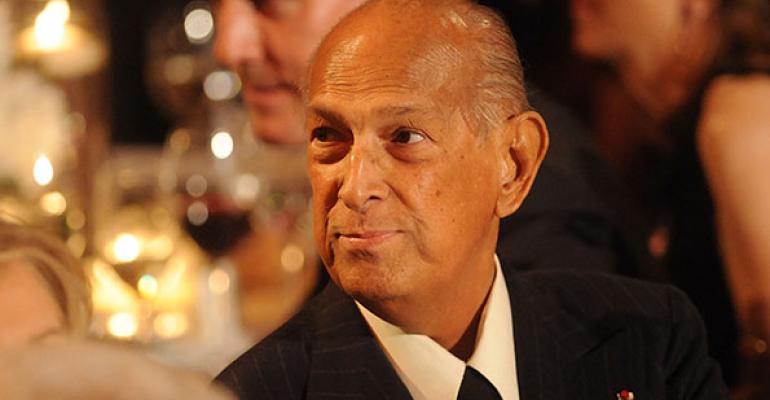The details of late fashion icon Oscar de la Renta’s will have come out and are causing quite a stir. The main reason for all of the hubbub is that the designer left the vast majority of his estate to his second wife, Annette (his first wife, Francoise, died of cancer 30 years ago), and lumped his only child, adopted son Moises, in with his three stepchildren (all Annette’s from a prior marriage) as the beneficiaries of a much smaller trust. Apparently, this “snub” is punishment for Moises having the temerity to attempt to create his own fashion line ten years ago that potentially could have competed with Oscar’s brand (spoiler alert: it didn’t), a sin for which the designer allegedly never forgave him.
The gossip rags have, of course, jumped all over what they view as the tawdry details of Oscar “disinheriting” his son, going to lengths to emphasize that, for instance, Moises “was warned that if he ever tried to contest the will, he would be cut out completely.” Further, they seem to find the fact that Oscar named his stepdaughter, Eliza Bolen, as the alternate executor, instead of Moises, particularly interesting. Scandalous.
It all seems pretty incendiary when put into such language, yet the more details that arise, the more I wonder, “What’s the big deal?” Underneath it all, this seems like a fairly typical will/estate plan for a blended family. Leaving the majority of your estate to your wife with the remainder in trust for your children is pretty textbook, after all.
True, Annette is Oscar’s second wife, which can be a common point of stress, and the will in question was signed only weeks before Oscar’s death, which is maybe a bit fishy (but not necessarily), but it’s not as if she’s some latecomer who swooped in and tricked an old millionaire into setting her up for life. They’ve been married for 25 years. Further, she’s herself the adopted daughter of Charles Engelhard, Jr., international mining magnate, and the rumored inspiration for the Bond villain Goldfinger. I think it’s safe to speculate that she doesn’t really need Oscar’s money. Now, Annette may yet cut Moises out of her will in favor of her own natural children, at which point we can all start talking about snubs, but there's no evidence to believe that will be the case. (How the daughter of a man who made his fortune in Apartheid-era South Africa will treat her black stepson is certainly a juicy potential topic but is also pure speculation and WAY beyond the scope of this article.)
As for the two details mentioned above, while it may seem unusual to name a stepchild as executor over one’s own child, it’s important to note that Eliza is a vice president of Oscar’s fashion house and her husband, Alex, is the CEO. Moises also works there—as a designer. Frankly, this seems like a simple case of choosing the best person for the job. If we could put aside our preconceived notions of children and stepchildren and their roles and consider them all equally, is choosing your professional executive daughter (who you already trust to run your business) over your creative, artistic son as executor, an administrative position, really such a stretch? Seems like a no brainer, actually. As for the “threat” against Moises’ inheritance if he contests the will, that looks like boilerplate no contest clause language to me, which, last I checked, is a pretty standard inclusion in many wills.
It’s always interesting when estate-planning issues hit the news and we get to see the public at large react to them. And, maybe as more details come out, it will be revealed that something of note actually happened here, but right now, this “controversy” looks like much ado about nothing.





